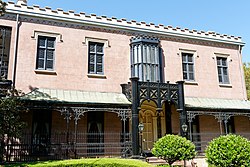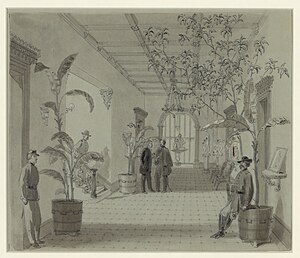Green–Meldrim House
Green–Meldrim House | |
 Green–Meldrim House in 2015 | |
| Location | Savannah, Georgia |
|---|---|
| Coordinates | 32°4′26″N 81°5′41″W / 32.07389°N 81.09472°W |
| Built | 1850 |
| Architect | John S. Norris |
| Architectural style | Gothic Revival |
| Part of | Savannah Historic District (Savannah, Georgia) (ID66000277) |
| NRHP reference No. | 74000664 |
| Significant dates | |
| Added to NRHP | January 21, 1974[1] |
| Designated NHL | May 11, 1976[2] |
The Green–Meldrim House is a historic house at 14 West Macon Street, on the northwest corner of Madison Square in Savannah, Georgia.[3][4] Built in the 1850s, it was designated as a National Historic Landmark in 1976 as one of the American South's finest and most lavish examples of Gothic Revival architecture.[5][6] The house is owned by the adjacent St. John's Episcopal Church, which offers tours and uses it as a meeting and reception space.
Description
The Green–Meldrim House is located on the west side of Madison Square in central Savannah, at the southwest corner of West Harris and Bull Streets. West Macon Street, the house's address, is a spur street off Whitaker Street, which runs behind the property. The house's principal facade faces south, with a porch and garden facing the square. The house is among the best-known examples of the Gothic Revival style in the South, with a stuccoed brick exterior, cast-iron porch, oriel windows, and an imposing front cast-iron fence. The main entrance has an iron portico believed to be unique in the United States, with octagonal posts supported a pair of arches. A crenellated parapet rings the roof. The interior of the house, following a center-hall plan, retains original woodwork, plaster, and ironwork, the latter featuring a freestanding staircase.[7]
History

The house was designed and built between 1853 and 1861 at a cost of $93,000 by the architect John Norris.[8][9] The property's first owner was Charles Green, a wealthy cotton merchant and grandfather of the writer Julien Green.[10]
At this time, none of the original furniture is on display at the house. After the Union troops captured Savannah in 1864, Sherman occupied the house and used it as a headquarters until the end of the Civil War.[11] It was in this house in December 1864 that Sherman composed his famous telegram to President Lincoln, in which he communicated his desire to present to the President "as a Christmas Gift the City of Savannah, with one hundred and fifty heavy guns and plenty of ammunition, and also about twenty-five thousand bales of cotton"; the cotton belonged to Charles Green, the owner of the House.[12][13] In 1892, local politician and judge Peter Meldrim purchased the property and lived in it a number of decades.[14] In 1943, his heirs sold the house to St John's Church, which is located next door. In the 1950s, Savannah Landscape Architect Clermont Huger Lee provided period appropriate designs and planting plans for the garden. [15] Tours of the house are given during the day, and the church uses it for wedding receptions and after-church events.[16]
Photos
-
Green–Meldrim house in 2011
-
The library of the Green–Meldrim House
-
Side view
-
Historical marker
See also
- List of National Historic Landmarks in Georgia (U.S. state)
- National Register of Historic Places listings in Chatham County, Georgia
References
- ^ "National Register Information System". National Register of Historic Places. National Park Service. January 23, 2007.
- ^ "Green–Meldrim House". National Historic Landmark summary listing. National Park Service. Archived from the original on 2009-01-31. Retrieved 2008-06-21.
- ^ "Savannah, GA - Official Website". savannahga.gov. Archived from the original on 25 October 2007. Retrieved 14 April 2015.
- ^ "Madison Square". visit-historic-savannah.com. Retrieved 14 April 2015.
- ^ "Lists of National Historic Landmarks". National Park Service.
- ^ "Archived copy". Archived from the original on 2009-01-31. Retrieved 2008-06-21.
{{cite web}}: CS1 maint: archived copy as title (link) - ^ "NHL nomination for Green–Meldrim House". National Park Service. Retrieved 2015-12-22.
- ^ "Norris, John S. (1804-1876)". ncsu.edu. Retrieved 14 April 2015.
- ^ "John Norris (1804-1876)". New Georgia Encyclopedia. Retrieved 14 April 2015.
- ^ "Julien Green (1900-1998)". New Georgia Encyclopedia. Retrieved 14 April 2015.
- ^ "Green–Meldrim House". visit-historic-savannah.com. Retrieved 14 April 2015.
- ^ National Archives and Records Administration. "Prologue: Pieces of History". archives.gov. Retrieved 14 April 2015.
- ^ "Archived copy". Archived from the original on 2011-10-02. Retrieved 2011-08-23.
{{cite web}}: CS1 maint: archived copy as title (link) - ^ Polk’s Savannah City Directories
- ^ Dolder, Ced (Spring 2014). "Clermont Lee, (1914-2006) Pioneering Savannah Landscape Architect" (PDF). Magnolia – Publication of the Southern Garden History Society. XXVII (2): 4. Retrieved 16 February 2020.
- ^ "Green–Meldrim House". St. John's Church Savannah GA. Retrieved 14 April 2015.






